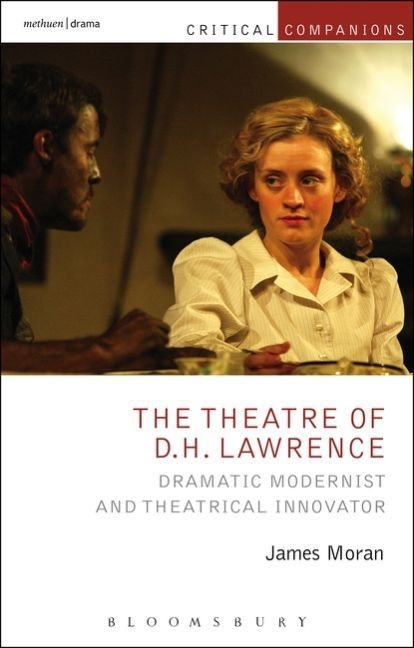Share
Fr. 46.90
James Moran, James (University of Nottingham Moran, Erin Hurley, Patrick Lonergan
The Theatre of D.H. Lawrence - Dramatic Modernist and Theatrical Innovator
English · Paperback / Softback
New edition in preparation, currently unavailable
Description
Zusatztext Lawrence wrote eight finished plays and left two unfinished. In The Theatre of D.H. Lawrence ! James Moran seeks to understand his development as a dramatist ... This book greatly expands how Lawrence is understood and should encourage further scholarship into Lawrence's plays and the impact that theatre had on him as a writer. Informationen zum Autor James Moran is Head of Drama in the School of English Studies at the University of Nottingham, UK. He is the author of The Theatre of Seán O'Casey (Bloomsbury Methuen Drama, 2013). His other books include: Staging the Easter Rising (2005), and as editor Four Irish Rebel Plays (2007). Klappentext This is the first major book-length study for four decades to examine the plays written by D. H. Lawrence, and the first ever book to give an in-depth analysis of Lawrence's interaction with the theatre industry during the early twentieth century. It connects and examines his performance texts, and explores his reaction to a wide-range of theatre (from the sensation dramas of working-class Eastwood to the ritual performances of the Pueblo people) in order to explain Lawrence's contribution to modern drama. F. R. Leavis influentially labelled the writer 'D. H. Lawrence: Novelist'. But this book foregrounds Lawrence's career as a playwright, exploring unfamiliar contexts and manuscripts, and drawing particular attention to his three most successful works: The Widowing of Mrs Holroyd , The Daughter-in-Law , and A Collier's Friday Night . It examines how Lawrence's novels are suffused with theatrical thinking, revealing how Lawrence's fictions - from his first published work to the last story that he wrote before his death - continually take inspiration from the playhouse. The book also argues that, although Lawrence has sometimes been dismissed as a restrictively naturalistic stage writer, his overall oeuvre shows a consistent concern with theatrical experiment, and manifests affinities with the dramatic thinking of modernist figures including Brecht, Artaud, and Joyce. In a final section, the book includes contributions from influential theatre-makers who have taken their own cue from Lawrence's work, and who have created original work that consciously follows Lawrence in making working-class life central to the public forum of the theatre stage.The first book-length study to examine the plays written by D.H. Lawrence alongside the films inspired by his novels. Zusammenfassung This is the first major book-length study for four decades to examine the plays written by D. H. Lawrence, and the first ever book to give an in-depth analysis of Lawrence’s interaction with the theatre industry during the early twentieth century. It connects and examines his performance texts, and explores his reaction to a wide-range of theatre (from the sensation dramas of working-class Eastwood to the ritual performances of the Pueblo people) in order to explain Lawrence's contribution to modern drama. F. R. Leavis influentially labelled the writer 'D. H. Lawrence: Novelist'. But this book foregrounds Lawrence's career as a playwright, exploring unfamiliar contexts and manuscripts, and drawing particular attention to his three most successful works: The Widowing of Mrs Holroyd , The Daughter-in-Law , and A Collier's Friday Night . It examines how Lawrence's novels are suffused with theatrical thinking, revealing how Lawrence’s fictions – from his first published work to the last story that he wrote before his death – continually take inspiration from the playhouse. The book also argues that, although Lawrence has sometimes been dismissed as a restrictively naturalistic stage writer, his overall oeuvre shows a consistent concern with theatrical experiment, and manifests affinities with the dramatic thinking of modernist figures including Brecht, Artaud, and Joyce. In a final sect...
List of contents
Acknowledgements
Foreword by Sir Richard Eyre
Synopsis
Introduction. The Significance of Lawrence's Plays: Shifts in Reputation from 1930 to 2014
Chapter 1. Writing Lawrence's Plays: Becoming a Dramatist, 1885 to 1910
Chapter 2. The Frustration of Staging: Dramatic Struggles, 1911 to 1930
Chapter 3. The Drama of Lawrence's Prose Fiction: the Playwright as Novelist
Chapter 4. Lawrence's Theatrical Development: Realist and Experimentalist Crosscurrents
Chapter 5. A Director's Perspective: Peter Gill, in Conversation with James Moran
Chapter 6. A Playwright's Perspective: Stephen Lowe
Chapter 7. A Screenwriter's Perspective: William Ivory
Chapter 8. A Postcolonial Perspective: Soudabeh Ananisarab
Conclusion
Appendix: Timeline
Endnotes
Bibliography
Index
Report
Moran provides a thorough discussion of the working dynamics of [Lawrence's] plays and displays a keen affinity for demonstrating the theatrical dependency of Lawrence's novels. After an introductory overview of Lawrence and his cultural milieu, Moran devotes chapters to Lawrence's transition into playwriting, his difficulties with the genre, specific correlations with his novels, and his maturation as a dramatist. . Replete with notes and an extended bibliography, Moran's study enhances appreciation of an important facet of Lawrence's artistry. Summing Up: Recommended. Upper-division undergraduates through faculty and professionals. CHOICE
Product details
| Authors | James Moran, James (University of Nottingham Moran |
| Assisted by | Erin Hurley (Editor), Patrick Lonergan (Editor) |
| Publisher | Methuen Drama |
| Languages | English |
| Product format | Paperback / Softback |
| Released | 19.11.2015 |
| EAN | 9781472570376 |
| ISBN | 978-1-4725-7037-6 |
| No. of pages | 264 |
| Series |
Critical Companions Critical Companions |
| Subjects |
Humanities, art, music
> Art
> Theatre, ballet
Non-fiction book > Music, film, theatre |
Customer reviews
No reviews have been written for this item yet. Write the first review and be helpful to other users when they decide on a purchase.
Write a review
Thumbs up or thumbs down? Write your own review.

